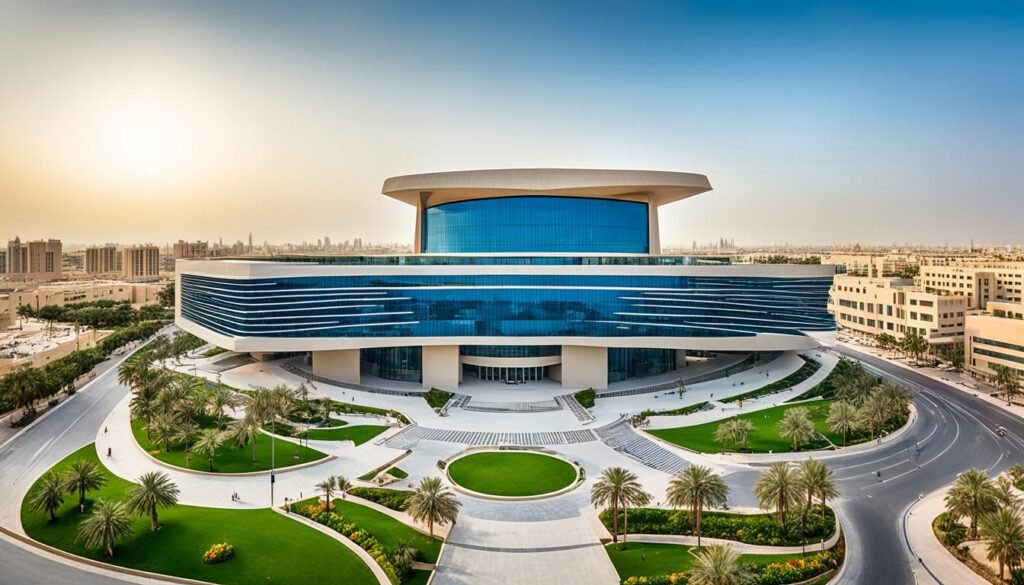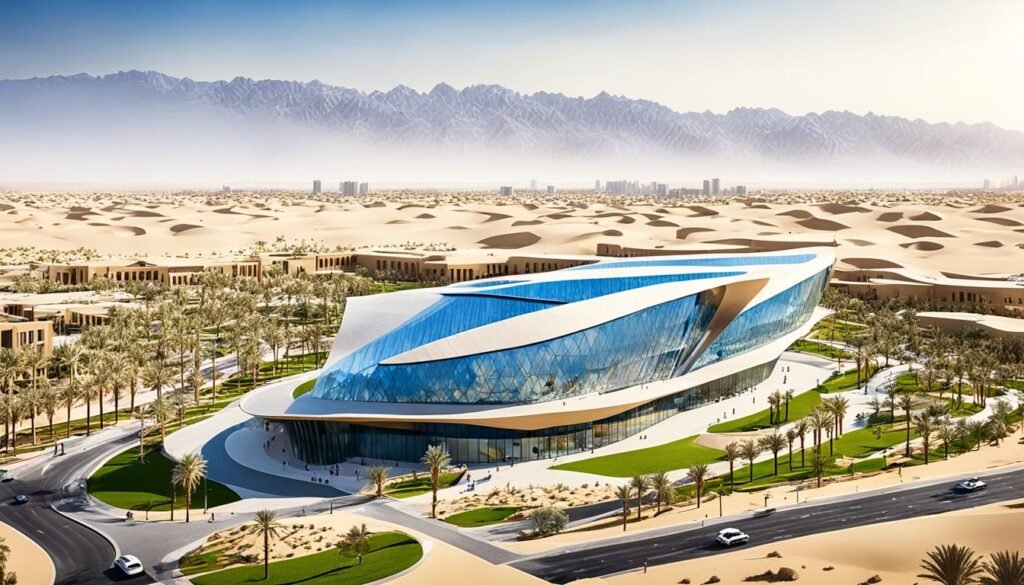Did you know that Kuwait is home to some of the largest oil and gas reserves in the world, accounting for over 6% of global crude oil production? This small Middle Eastern nation has become a hub for petroleum engineering excellence, attracting students from across the globe to its prestigious graduate programs.
At the forefront of Kuwait’s energy education landscape is the College of Engineering and Petroleum (COEP) at Kuwait University. Established in 1974, this renowned institution offers a comprehensive suite of master’s degree programs, including a highly coveted Petroleum Engineering program. With its cutting-edge facilities, innovative curriculum, and renowned faculty, COEP stands as a beacon for aspiring petroleum engineers seeking to advance their careers in the region’s thriving oil and gas industry.
Key Takeaways
- Kuwait is a major player in the global oil and gas industry, accounting for over 6% of global crude oil production.
- The College of Engineering and Petroleum at Kuwait University offers a prestigious master’s program in Petroleum Engineering.
- Established in 1974, COEP is recognized for its cutting-edge facilities, innovative curriculum, and renowned faculty.
- The Petroleum Engineering master’s program at COEP provides a unique opportunity for students to gain expertise in the region’s thriving energy sector.
- Kuwait City, the capital of Kuwait, serves as the hub for the country’s oil and gas industry, making it an ideal location for graduate studies in Petroleum Engineering.
The Prestigious College of Engineering and Petroleum at Kuwait University
Kuwait University’s College of Engineering and Petroleum (COEP) has been a beacon of excellence in the Middle East’s engineering education landscape since its establishment in 1974. This esteemed institution is committed to providing world-class engineering programs, including the renowned petroleum engineering degree, to address the evolving needs of society.
Established in 1974
COEP’s rich history and pedigree are reflected in its founding in 1974, making it one of the oldest and most respected engineering colleges in the region. Over the decades, the college has continuously expanded its academic offerings and infrastructure to maintain its position as a leading engineering institution in the Middle East.
Accredited Engineering Programs
The College of Engineering and Petroleum at Kuwait University takes pride in its accredited engineering programs, which are recognized for their quality and rigor. All of the college’s engineering degrees, including the highly sought-after petroleum engineering program, are accredited by the Engineering Accreditation Commission of ABET Inc., ensuring that students receive a comprehensive and industry-relevant education.

Ranking of Kuwait Universities in Petroleum Engineering
Kuwait universities have made significant strides in the field of petroleum engineering, with two institutions standing out in the latest rankings. According to a comprehensive analysis of research performance, the academic publications and citations from these universities have been evaluated to determine their standing in the global landscape of petroleum engineering.

The ranking considered the impressive total of 7,130 citations received by 518 academic papers produced by Kuwait universities. These figures were meticulously adjusted for publication dates, ensuring a fair and accurate assessment of the institutions’ research impact and contributions to the field of petroleum engineering.
The results of this rigorous evaluation showcase the strong research capabilities and academic prowess of Kuwait universities in the realm of petroleum engineering. With their dedication to innovative research and impactful publications, these institutions are firmly establishing their position as leading hubs for petroleum engineering education and exploration.
Innovative Architectural Design of COEP
The newly completed College of Engineering and Petroleum (COEP) at Sabah Al-Salem University City in Kuwait has been designed to create a welcoming and engaging learning environment for students. The building’s unique architectural features have been recognized for their innovative approach to sustainable design.
Zig-Zag Configuration for Optimal Functionality
The COEP building’s zig-zag configuration of parallel connected masses and corridors creates a series of shaded courtyards, providing ample space for experiments, research, and outdoor activities. This dynamic layout not only enhances the functionality of the facility but also contributes to a more interactive and collaborative learning experience for students.
Sustainable Terracotta Cladding
The exterior of the COEP building is clad in a distinctive terracotta rain screen, selected for its durability, sustainability, moisture control, and acoustic properties. This choice of materials aligns with the institution’s commitment to sustainable design and reflects the College’s focus on environmental responsibility.
The innovative architectural design of the College of Engineering and Petroleum has been recognized with the Award of Excellence 2021 from the American Concrete Institute’s Kuwait Chapter, showcasing the institution’s dedication to creating a state-of-the-art learning environment for its students.

Kuwait: Petroleum Engineering Master’s Kuwait City
Kuwait City, the vibrant capital of Kuwait, stands as a hub for the country’s thriving oil and gas industry. The College of Engineering and Petroleum at Kuwait University offers prestigious master’s degree programs in various engineering disciplines, including Petroleum Engineering. These graduate programs are designed to equip students with the specialized knowledge and skills needed to excel in the dynamic energy sector of the Middle East.

The Petroleum Engineering master’s program at Kuwait University’s College of Engineering and Petroleum is a highly sought-after graduate program. It provides students with a comprehensive understanding of the latest technologies, techniques, and industry best practices in the field of petroleum exploration, extraction, and production. Graduates of this program are poised to make significant contributions to Kuwait’s thriving oil and gas industry, as well as the broader energy sector in the region.
Beyond the academic rigor, the College of Engineering and Petroleum also fosters a vibrant and engaging learning environment, supporting students’ personal and professional development. With state-of-the-art facilities, experienced faculty, and a diverse student community, the college ensures that aspiring petroleum engineers receive a well-rounded education that prepares them for the challenges and opportunities in the energy industry.
Cutting-Edge Facilities at COEP
The College of Engineering and Petroleum (COEP) at Kuwait University’s Sabah Al-Salem University City campus boasts state-of-the-art facilities that support its comprehensive academic and research programs. From sophisticated auditoria to cutting-edge laboratories, COEP provides students with a modern and well-equipped learning environment tailored for advanced engineering education.
Sophisticated Auditoria and Lecture Halls
The college features two impressive 500-seat auditoria, designed to host large-scale lectures, presentations, and conferences. Additionally, COEP houses two spacious 120-seat lecture halls, equipped with the latest audio-visual technologies to enhance the learning experience for students in the engineering programs.
State-of-the-Art Laboratories
Complementing the college’s impressive classroom facilities, COEP boasts a wide range of specialized laboratories catering to various engineering disciplines. These state-of-the-art laboratories are outfitted with the latest equipment and instrumentation, enabling students to engage in hands-on, practical learning and cutting-edge research projects that prepare them for the demands of the engineering field.
Graduate Programs Offered at COEP
The College of Engineering and Petroleum (COEP) at Kuwait University offers an impressive array of graduate programs, leading to Master of Science degrees in various engineering disciplines. These advanced programs are designed to equip students with the specialized knowledge and practical skills needed to excel in their chosen field of engineering.
Master’s Degrees in Diverse Engineering Fields
At COEP, students can pursue master’s degrees in a wide range of engineering specialties, including Electrical, Civil, Mechanical, Chemical, and Petroleum Engineering. Each of these graduate programs delves deep into the latest theories, technologies, and industry practices, preparing students to become leaders in their respective engineering disciplines.
The curriculum for these master’s programs is constantly updated to reflect the evolving demands of the engineering field, ensuring that graduates are well-equipped to tackle the challenges of the modern workforce. Through a combination of rigorous coursework, hands-on laboratories, and real-world case studies, students gain the critical thinking and problem-solving skills needed to drive innovation and progress in Kuwait’s thriving engineering landscape.
Career Prospects in Kuwait’s Oil and Gas Industry
Kuwait’s thriving oil and gas industry offers excellent career opportunities for graduates of petroleum engineering programs. As a major player in the Middle East’s energy sector, Kuwait provides numerous avenues for petroleum engineers to apply their expertise in various roles within the industry. These roles contribute to the country’s economic development and energy security, making the oil and gas industry an attractive career path for aspiring professionals.
Petroleum engineering graduates in Kuwait can find employment in a wide range of positions, including reservoir engineering, production engineering, drilling engineering, and project management. These roles involve tasks such as optimizing oil and gas extraction, designing and overseeing drilling operations, and managing the implementation of energy projects. The demand for skilled petroleum engineers is consistently high, as Kuwait continues to invest in the expansion and modernization of its energy infrastructure.
Moreover, the oil and gas industry in Kuwait offers competitive salaries and benefits, as well as opportunities for professional growth and development. Petroleum engineers can expect to work in state-of-the-art facilities, utilize cutting-edge technologies, and collaborate with international teams, providing them with a dynamic and intellectually stimulating work environment.
For those seeking a career in the energy sector, Kuwait’s oil and gas industry presents a promising and rewarding path. The expertise and skills gained through a petroleum engineering education can be applied to drive innovation, enhance energy production, and contribute to the nation’s ongoing economic and technological progress.
Student Life and Support Services
At the College of Engineering and Petroleum (COEP) at Kuwait University, the commitment to student success extends far beyond the classroom. The college cultivates an engaging learning environment that fosters personal and professional growth for its students. From state-of-the-art facilities to personalized academic support, COEP ensures that every student has the resources necessary to thrive.
Engaging Learning Environment
The student life at COEP is vibrant and dynamic. The college’s cutting-edge infrastructure, including sophisticated auditoria and lecture halls, creates an atmosphere conducive to active learning and collaboration. Students have ample opportunities to engage in hands-on projects, participate in student organizations, and attend guest lectures by industry experts, all of which contribute to an enriching educational experience.
Personalized Academic Support
COEP understands that each student has unique needs and learning styles. To ensure their academic success, the college provides personalized support services tailored to individual requirements. From dedicated faculty mentors to peer-to-peer tutoring programs, students can access the resources they need to excel in their studies and reach their full potential.
Conclusion
Kuwait City, the capital of Kuwait, is home to the prestigious College of Engineering and Petroleum at Kuwait University. This esteemed institution offers top-quality master’s programs in petroleum engineering and other engineering disciplines, equipping students with the knowledge and skills needed to thrive in the country’s dynamic oil and gas industry.
With cutting-edge facilities, innovative architectural design, and a commitment to student success, the College of Engineering and Petroleum provides an exceptional educational experience for aspiring engineers in the Middle East. The college’s programs, accredited and ranked among the best in Kuwait, prepare graduates to make meaningful contributions to the region’s thriving petroleum industry.
Whether you’re seeking to advance your career or lay the foundation for a promising future in the field of petroleum engineering, the College of Engineering and Petroleum at Kuwait University offers an exceptional opportunity to unlock your full potential and make a lasting impact in the dynamic and ever-evolving energy landscape of the Middle East.
Source Links
- Best Petroleum Engineering universities in Kuwait [Rankings] – https://edurank.org/engineering/petroleum/kw/
- Kuwait University, College of Engineering and Petroleum – Gulf Consult – https://www.gckuwait.com/portfolio_page/kuwait-university-college-of-engineering-and-petroleum/
- College of Engineering and Petroleum | Kuwait University – https://www.ku.edu.kw/colleges/engineering-and-petroleum


